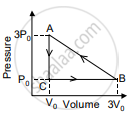Advertisements
Advertisements
प्रश्न
Write a note on free expansion.
उत्तर
- Free expansions are adiabatic expansions thus there is no exchange of heat between a system and its environment.
- Also, there is no work done on the system or by the system. Q = W = 0, and according to the first law of thermodynamics, ΔU = 0.
- For example, when a balloon is ruptured suddenly, or a tire is suddenly punctured, the air inside rushes out rapidly but there is no displacement of a piston or any other surface.
- A free expansion is different than other thermodynamic processes because it is an uncontrolled change. It is an instantaneous change and the system is not in thermodynamic equilibrium.
- A free expansion cannot be plotted on a p-V diagram. Only it's initial and the final state can be plotted.
APPEARS IN
संबंधित प्रश्न
A thermodynamic system is taken from an original state to an intermediate state by the linear process shown in Figure

Its volume is then reduced to the original value from E to F by an isobaric process. Calculate the total work done by the gas from D to E to F
Draw a p-V diagram of the reversible process.
State the assumptions made for thermodynamic processes.
Explain the cyclic process.
Explain work done during a thermodynamic process.
Explain the thermodynamics of the isobaric process.
Explain the thermodynamics of the isochoric process.
When food is cooked in a vessel by keeping the lid closed, after some time the steam pushes the lid outward. By considering the steam as a thermodynamic system, then in the cooking process
In an isochoric process, we have ____________.
Give an expression for work done in an isothermal process.
Apply first law for an isothermal process.
Draw the PV diagram for the isochoric process.
Can the given heat energy be completely converted to work in a cyclic process? If not, when can the heat can completely converted to work?
In a petrol engine, (internal combustion engine) air at atmospheric pressure and temperature of 20°C is compressed in the cylinder by the piston to `1/8` of its original volume. Calculate the temperature of the compressed air. (For air γ = 1.4)
For a given ideal gas 6 × 105 J heat energy is supplied and the volume of gas is increased from 4 m3 to 6 m3 at atmospheric pressure. Calculate
- the work done by the gas
- change in internal energy of the gas
- graph this process in PV and TV diagram
Among the amount of heat absorbed and the amount of work done by a system, ______
One mole of an ideal gas with `gamma` = 1.4 is adiabatically compressed so that its temperature rises from 27° C to 47° C. The change in the internal energy of the gas is (R = 8.3 J/mol.K) ____________.
Two identical samples of a gas are allowed to expand (i) isothermally (ii) adiabatically. Work done is ____________.
In an isothermal process, the volume of an ideal gas is halved. One can say that ____________.
Assertion: Equal volumes of monatomic and polyatomic gases are adiabatically compressed separately to equal compression ratio `("P"_2/"P"_1)`. Then monatomic gas will have greater final volume.
Reason: Among ideal gases, molecules of a monatomic gas have the smallest number of degrees of freedom.
An ideal gas is compressed to half its initial volume by means of several processes. Which of the process results in the maximum work done on the gas?
Ideal gas for which 'ϒ' = 1.5 is suddenly compressed to `1/4`th of its initial volume. The ratio of 4 the final pressure to the initial pressure is ______.
`(ϒ = "C"_"p"/"C"_"v")`
Which of the following processes is reversible?
In the figure shown here, the work done in the process ACBA is ______.

Explain the thermodynamic process.
Explain how can a gas be expanded at constant temperature.
In a cyclic process, if ΔU = internal energy, W = work done, Q = Heat supplied then ______.
